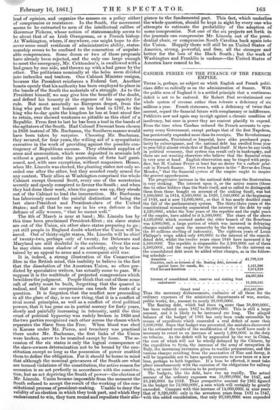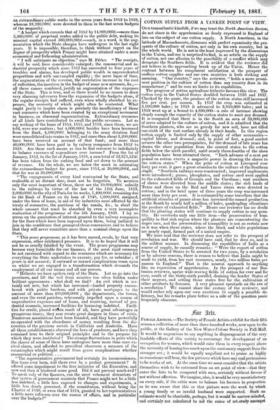CASIMIR PERIER ON THE FINANCE OF THE FRENCH EXPIRE.
THERE is, perhaps, no subject on which English and French politi- cians differ so radically as on the administration of finance. With the public men of England it is a settled principle that a continuous deficit is not to be endured. Sir Robert Peel revolutionised our whole system of revenue rather than tolerate a deficiency of six millions a year. French statesmen, with a deficiency of twice that amount, regard the financial future with complacency or indifference. Publicists now and again may inveigh against a chronic condition of insolvency, but once in power they are content placidly to expend. From the time when Cambon reduced the French accounts to sym- metry every Government, except perhaps that of the first Napoleon, has persistently expended more than its receipts. The Revolutionary Governments, Provisional or Imperial, have alike purchased popu- larity by extravagance, and the national debt has swelled from year to year till it almost rivals that of England itself. If there be any truth in political economy, that system can result only in bankrupty, and there are not wanting observers who believe that the financial crisis is very near at hand. English observation may be tinged with preju- dice, but N. Casimir Perier at least has no desire for a culbute gene- role in French finance. Yet even he argues in the "Revue des Deux Mondes," that the financial system of the empire ought to inspire the gravest apprehension. The progressive increase in the national debt since the Restoration is very striking. The interest upon it, or the active rentes (those due to other holders than the State itself, and so called to distinguish them from those bought on account of the sinking fund), was but 2,500,0001. in 1814, 6,560,0001. in 1830, 7,040,000/. at the beginning of 1848, and is now 12,600,0001., so that it has nearly doubled since the fall of the parliamentary system. The thirty-three years of the constitutional monarchy augmented the interest of the debt by only 4,520,000/., whilst the four years of the republic and the eight years of the empire, have added to it 5,560,000/. The share of the above 4,520,0001. which accrued under the elder branch of the Bourbons was 4,000,000, a large portion of which was incurred in defraying charges entailed upon the monarchy by the first empire, including the 40 millions sterling of indemnity. The eighteen years of Louis Philippe's reign added only 480,000/. to the interest of the consoli- dated debt, whilst the twelve years since 1848 have increased it by 5,560,000/. The republic is responsible for 2,100,0001. out of these 5,560,000/., and the empire for the remainder. To the interest on the consolidated debt must be added other charges, as in the follow- ing schedule :— Annuities £1 792,119 Sundries, such as interest of the floating debt, interest of
special loans for canals, esc 1,161,286 Civil fist and donations 1,074,229 £4,037,634 Interest of consolidated debt, reserves and sinking fund endowment 11,320,105 Grand total 215,347,989
Thus the necessary disbursements, exclusive of all those for the ordinary expenses of the ministerial departments of war, marine, public works, &c., amount to nearly 26,000,000/.
The floating debt, which had risen to. more than 38,600,0001., has been reduced since 1857 to 30,000,000/. This is still a large amount, and it is likely to be increased ere long. The alleged balance of the budget of 1861 has only been made ostensible by means of expedients which concealed a real deficit of more than 8,000,000/. Since that budget was presented, the mistakes discovered in the estimated results of the modification of the tariff have made it necessary to resort to an increase of nearly 1,200,000/. in the duty on tobacco. As the deficit will be augmented by the war in China, the cost of which will not be wholly defrayed by the Chinese, by the expedition to Syria, the increase of the army of occupation in Italy, the increasing extension given to warlike preparations, and the various charges resulting from the annexation of Nice and Savoy, it will be impossible not to have speedy recourse to new taxes or a new loan, perhaps to both together. If a loan be effected, it must take place`simultaneously with the emission of the obligations for railway works, or cause the emission to be postponed. The budgets, like the debt, have run up rapidly. The actual amount of the ordinary expenses was 58,000,0001. for 1847, and 58,240,0001. for 1852. Their prospective amount for 1861 figured in the budget for 72,000,0001., a sum which will certainly be greatly exceeded. Compare with this increase of 14,000,0001. in nine years that of 9,320,000/. only in the seventeen years from 1831 to 1847, with this added consideration, that only 20,320,0001. were expended on extraordinary public works in the seven years from 1852 to 1859, whereas 38,320,000/. were devoted to them m the last seven budgets of the monarchy. "A budget which exceeds that of 1852 by than 3,360,000/. of perpetual rentes added to the public debt, making its nominal capital exceed 360,000,0001.—such, in a word, is the aug- mentation which the State charges have 'undergone in the last eight years. It is impossible, therefore, to think without regret on the degree of prosperity which France might have attained under a more economical and forbearing administration.
"I will anticipate an objection," says M. Wrier. "The receipts, it will be said, have considerably enlarged; the commercial and in- dustrial prosperity which since 1852 has succeeded to four years of troubles and alarms, has developed public wealth in unprecedented proportions and with unexampled rapidity ; the mere lapse of time, the augmentation of the revenue, the correlative increase in the cost of collection, the insertion in the budget of some new accounts, all these causes combined, justify an augmentation of the expenses of the State. This is true, and so there would be no reason to draw very alarming inferences from the expansion of the budgets alone, if the regular receipts had sufficed, even when wholly absorbed by ex- penses, the necessity of which might often be contested. What ought justly to inspire alarm is precisely the insufficiency of those vast resources which have been created by an exceptional movement in business, an abnormal superexcitation. Extraordinary resources of all kinds have contributed to swell the public revenues. Let us say nothing of the loans of 1854, 1855, and 1859, since these, we are told, were war matters; but 4,000,0001. besides have been borrowed from the Bank, 4,500,000/. belonging to the army dotation fund were consolidated into rentes in 1857, and since then about 3,200,000/. have been received on account of that fund; and more than 40,000,0001. have been paid in by railway companies from 1852 to 1858. Are these such means as can be had recourse to indefinitely to balance excesses of expenditure over income? From the 1st of January, 1852, to the 1st of January,1858, a sum total of 22,671,524/. has been taken from the sinking fund and set down to the account of revenue. On the whole, we are below the mark in estimating the extraordinary budget for peace, since 1852, at 30,000,0001., and that for war at 50,000,0001.
"The engagements of every kind contracted by the State, and realizable at no distant date, must not be forgotten. To mention only the most important of these, there are the 10,000,0001. subsidy to the railways by virtue of the law of the 11th June, 1859, 2,000,0001. to the city of Paris for its works, 1,400,000/. remaining due to the Bank of France on its loan of 1848, 1,600,0001. assigned, under the form of loans, in aid of the industries most affected by the treaty of commerce, the purchase of the canals, &c., in short the whole amount that must be absorbed by even a very incomplete realization of the programme of the 5th January, 1860. I lay no stress on the guarantees of interest granted to the railway companies for the lines which have been imposed upon them, being inclined to join in the confidence that prompted those concessions and to believe that they will never constitute more than a nominal charge upon the State.
"This peace programme, as it has been named, recals, by that very expression, other celebrated promises. It is to be hoped that it will not be as cruelly falsified by the event. The peace programme may become very formidable for our finances, if the most rigid economy be not exercised with regard to the resources which are necessary for everything the State undertakes to execute, pay for, or subsidize; if peace is not assured; if outward or. inward complications come upon us whilst we are engaged in a transformation which demauds the employment of all our means and all our powers.
Hitherto we have spriken only of the State. Let us go into the provinces, and lift the veil from miseries too often hidden under brilliant appearances : what shall we find? An evil which is cer- tainly not new, but• which has increased—landed property encum- bered with public burdens, and with .private mortgages to the amount of more than 480,000,0001.; the departments, the towns, and even the rural parishes, vehemently impelled upon a course of unproductive expenses and of loans, and receiving, instead of pru- dential counsels, increased facilities for becoming indebted. Facili- ties for credit, placed within reach of all, have great advantages in prosperous times; they may create great dangers in times of crisis. Numerous associations have been founded, and they have powerfully co-operated with the abundance of money resulting from the dis- coveries of the precious metals in California and Australia. Have all these establishments observed the laws of prudence, and have they remained true to their original principles and to the purpose for which they were instituted ? The strange fluctuations in price which the shares of some of them have undergone have more than once ex- cited alarm, and afforded to provident observers a measure of the catastrophes which might result from grave complications whether commercial or political. . . . • "The representative government had certainly its inconveniences. Has there ever been, will there ever be a perfect government ? It offered some impediment to the free initiative of the Executive, and now and then it hindered some good. Did it not prevent much evil? To speak only of the *lances, can the most vehement detractors of
that .system of government maintain that France might not be a little less indebted, a little less exposed to dares and experiments, a little less dearly governed, if the constitution, without being the Charter of 1830, or even that of 1814, granted to her representatives a little more influence over the course of affairs, and in particular over the budgets?"































 Previous page
Previous page